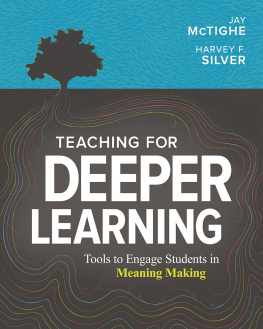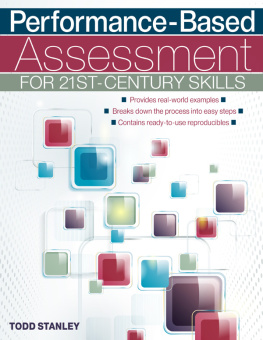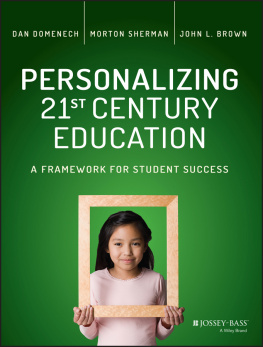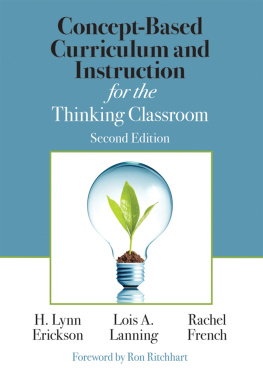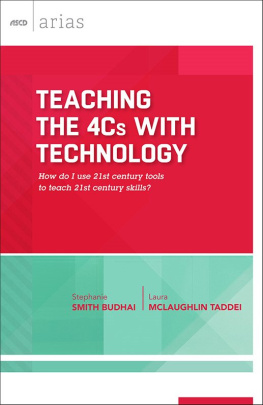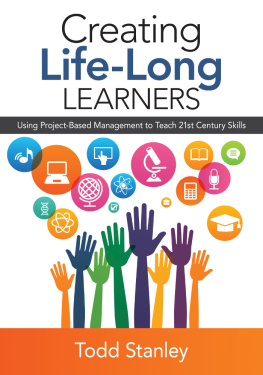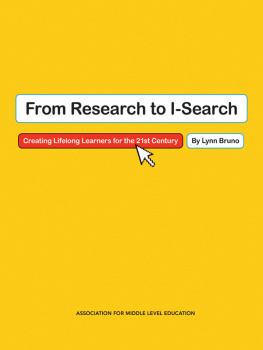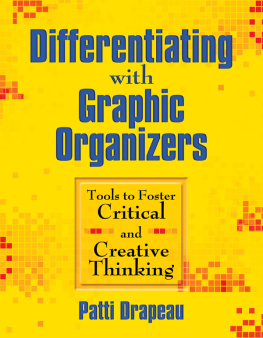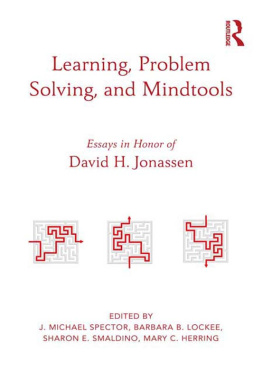

Copyright 2015 by Solution Tree Press
All rights reserved, including the right of reproduction of this book in whole or in part in any form.
555 North Morton Street
Bloomington, IN 47404
800.733.6786 (toll free) / 812.336.7700
FAX: 812.336.7790
email:
solution-tree.com
Visit go.solution-tree.com/21stcenturyskills to access materials related to this book.
Printed in the United States of America
18 17 16 15 14 1 2 3 4 5

Library of Congress Cataloging-in-Publication Data
Deeper learning : beyond 21st century skills / James Bellanca, Editor ; contributors, Suzie Boss [and others].
pages cm
Includes bibliographical references and index.
ISBN 978-1-936763-35-1 (perfect bound) 1. Learning ability. 2. Learning strategies. 3. Thought and thinking. 4. Teaching. I. Bellanca, James A., 1937
LB1134.D38 2015
370.15'23--dc23
2014033229
Solution Tree
Jeffrey C. Jones, CEO
Edmund M. Ackerman, President
Solution Tree Press
President: Douglas M. Rife
Associate Acquisitions Editor: Kari Gillesse
Editorial Director: Lesley Bolton
Managing Production Editor: Caroline Weiss
Senior Production Editor: Edward M. Levy
Copy Editor: Rachel Rosolina
Proofreader: Ashante Thomas
Cover and Text Designer: Laura Kagemann
Dedication
To Reuven Feuerstein (19212014)
This year was saddened by the passing of Reuven Feuerstein, a great mind in the fields of education and psychology. Following in the footsteps of his teachers and mentors, Jean Piaget and Andr Rey, Reuven became one of the geniuses of developmental and cognitive psychology. In the mid-twentieth century, his theory of structural cognitive modifiability and his teaching method of mediated learning experience rocked the foundations of the education community. His work with children survivors of the Holocaust inspired these gallant propositions.
As the director of psychological services for the Youth Aliyah in Europe (immigration of young people), Reuven worked on improving the educational, psychological, and emotional needs of these young victims from their very traumatic experiences during the Nazi regime. He also began to question the then current beliefs regarding the stability of intelligence. He asked, What if, instead of measuring a childs acquired knowledge and intellectual skills, the ability to learn was evaluated first? And what if their intelligence was not a fixed attribute? What if intelligence can be taught and was in fact the ability to learn? (Feuerstein, Feuerstein, Falik, & Rand, 1979, 2003).
When he proclaimed to the public in the 1960s that intelligence was not fixed at birth, and that, indeed, the mind is flexible and modifiable throughout ones lifetime, people thought he was crazy; he was far ahead of his time in anticipating what we understand about the boundless possibilities of learning by all and our ability to change the structure of the brain. Twenty-first century neuroscientists are catching us up with precisely how that happens.
Over six decades, Reuven worked tirelessly to develop differentiated teaching methods and cognitive enrichment programs in order to create the structural change in thinking that produces metacognitive skills. He believed everyone can become a critical thinker, no matter their genetic makeup, economic status, or environmental or cultural differences. His seminal thoughts have not only changed the lives of millions around the globe but altered the belief systems we have had about educating children. Today, a growing number of educators around the globe are learning how to help every individual (educator, parent, and student). Reuvens methods and tools have had great influence, resting on his pioneering insistence that all of us can learn more, faster, and especially deeper for continuous growth in our thinking and learning abilities.
Until his last days, Reuven did his most beloved work, directly interacting with children and teaching adults how to do the same. Not only did he bring his great mind and vast array of skills to this work, he brought his generous heart. I and my family knew this not only professionally, but personally. Words will never be able to express the void that his passing has left.
In appreciation for what Reuven has brought to me, my family, and colleagues; to several of the contributing authors of this collection; to educators; and especially to the children who have benefited from his work, I dedicate to him this collection on deeper learning, a book that has grown from the seeds his thoughts planted in all of us.
James A. Bellanca
Reference
Feuerstein, R., Feuerstein, S., Falik, L., & Rand, Y. (2003). Dynamic assessments of cognitive modifiability. The learning essential assessment device. Jerusalem, Israel: ICELP Press. (Original work published 1979)
Acknowledgments
A book this complex deserves many thanks.
First, thanks to the contributors. They each have busy schedules but have found time to keep the process going forward, promptly meeting big and little deadlines and presenting their best and deepest insight for our consideration. What each has written about the connection between 21st century skills and deeper learning and the importance of these skills, processes, and outcomes to the future of education in the United States has truly provided us with leading edge food for deeper thought.
Thanks to Douglas Rife, Solution Tree Presss president, for his support and encouragement in adding this book to the Leading Edge collection. This book allows us all to hear the voices of those who are most passionate about the most substantive reforms in our local, state, and national education endeavors.
Gratitude goes to the editorial staff at Solution Tree Press, but especially to Ed Levy, who did his usually precise and accurate job with polite but insightful author queries and helpful, prompt responses.
I thank Helen Soul and Bernie Trilling, my colleagues in the Partnership for 21st Century Skills; Barbara Chow at the Hewlett Foundation; and Jay McTighe and Ken Kay at EdLeader21 for helping identify the issues, frame the essential questions, pick the authors, and set the tone of this book. Collaboration, communication, and critical and creative thinking in action!
I also want to celebrate the many teachers and school administrators with whom I and my colleagues at the Illinois Consortium have been toiling purposefully to integrate the 21st century skills and deeper learning outcomes into the most needy classrooms, often against giant obstacles held firmly in place by those who cling to the farm and factory ways of teaching and learning, ways that no longer work for these children who will be the leaders of tomorrow.
I especially want to celebrate the teachers and administrators at Reilly Elementary in Chicago. With almost no money, battered textbooks, too few technology tools, and a tsunami of mandates from the last century raining on them, these dedicated folks spent long and arduous hours and days, many outside the school week, taking multiple steps forward to transform instruction for their twelve hundred English language learners. Teachers and students alike learned from doing. Project-based learning became a reality in every classroom. Even though they lacked the resources of more favored schools, the Reilly family always and against great systemic odds, brought their hearts to make sure their students could become 21st century career and college ready. It is this faculty, and others like it, who happily, one small step at a time, are living the deeper learning paradigm.
Next page

